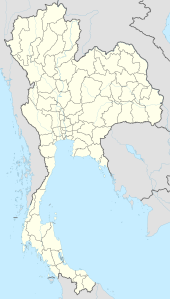Chiang Dao Wildlife Sanctuary
| Chiang Dao Wildlife Sanctuary | |
|---|---|
| เขตรักษาพันธุ์สัตว์ป่าเชียงดาว | |
 Doi Chiang Dao is the highest peak in the sanctuary. | |
Location in Thailand | |
| Location | Chiang Dao and Wiang Haeng districts, Chiang Mai Province |
| Coordinates | 19°24′16.078″N 98°55′24.718″E / 19.40446611°N 98.92353278°E |
| Area | 521 km2[1] |
| Established | 25 August 1978[2] |
| Governing body | Wildlife Conservation Office |
Chiang Dao Wildlife Sanctuary (Thai: เขตรักษาพันธุ์สัตว์ป่าเชียงดาว) is a protected area in Chiang Mai Province, Thailand. Established on 25 August 1978, the sanctuary covers 521 km2 (201 sq mi) of the Doi Chiang Dao and southern mountainous regions of the Daen Lao Range, north of the Thanon Thong Chai Range. The tallest summit is 2,175 m (7,136 ft) high Doi Chiang Dao.
The sanctuary area is covered by various forest types, depending on altitude, including dry evergreen forests, hill evergreen forests, coniferous forests, deciduous dipterocarp forests, and meadows. It is the home to a number of endangered species of animals, such as long-tailed gorals (Naemorhedus caudatus), Sumatran serows (Capricornis sumatraensis), Asian golden cats (Catopuma temminckii), and big-headed turtles (Platysternon megacephalum).[1] Deignan's babblers (Stachyridopsis rodolphei) and Huia melasma are endemic to this area.[3][4] This sanctuary is also home to Rhacophorus kio, a species of flying frog.[5]

Location
[edit]| Chiang Dao Wildlife Sanctuary in overview PARO 16 (Chiang Mai) | ||||||||||||||||||||||||||||||||||||||||||||||||||||||||||

|
See also
[edit]- Doi Chiang Dao
- Pha Daeng National Park, formerly known as Chiang Dao National Park.
References
[edit]- ^ a b Division of Information System on Wildlife Conservation. Wildlife Conservation Office. Department of National Parks, Wildlife and Plant Conservation (n.d.). เขตรักษาพันธุ์สัตว์ป่าเชียงดาว [Chiang Dao Wildlife Sanctuary] (in Thai). Retrieved 14 July 2016.
- ^ พระราชกฤษฎีกากำหนดบริเวณที่ดินป่าเชียงดาว ในท้องที่ตำบลเมืองแหง ตำบลเมืองงาย ตำบลเมืองคอง ตำบลเชียงดาว และตำบลแม่นะ อำเภอเชียงดาว จังหวัดเชียงใหม่ ให้เป็นเขตรักษาพันธุ์สัตว์ป่า พ.ศ. ๒๕๒๑ (PDF). Royal Gazette (in Thai). 95 (87 ฉบับพิเศษ): 19–20. 1978-08-24. Archived from the original (PDF) on August 14, 2016.
- ^ NorthThailandBirding.com (n.d.). "Endemics". Retrieved 14 July 2016.
- ^ IUCN SSC Amphibian Specialist Group. (2021). "Wijayarana melasma". IUCN Red List of Threatened Species. 2021: e.T61865A131437592. doi:10.2305/IUCN.UK.2021-3.RLTS.T61865A131437592.en. Retrieved 28 December 2024.
- ^ IUCN SSC Amphibian Specialist Group (2017). "Rhacophorus kio". IUCN Red List of Threatened Species. 2017: e.T135986A113960365. Retrieved 7 December 2022.
External links
[edit]- Division of Information System on Wildlife Conservation. Chiang Dao Wildlife Sanctuary (in Thai)
- Wildlife Conservation Office. Chiang Dao Wildlife Sanctuary (in Thai)
- Birdwatching, Doi Chiang Dao National Park

